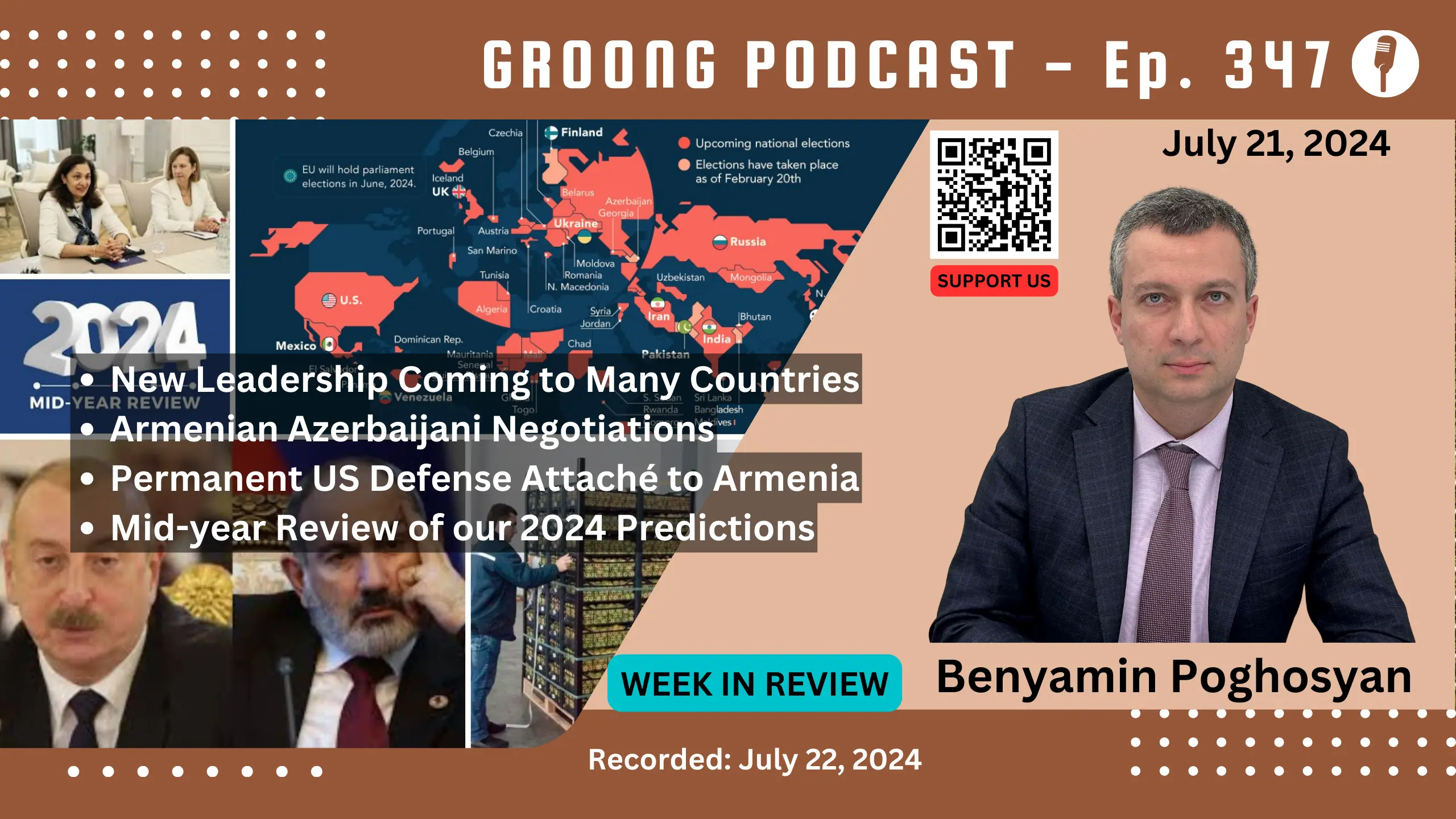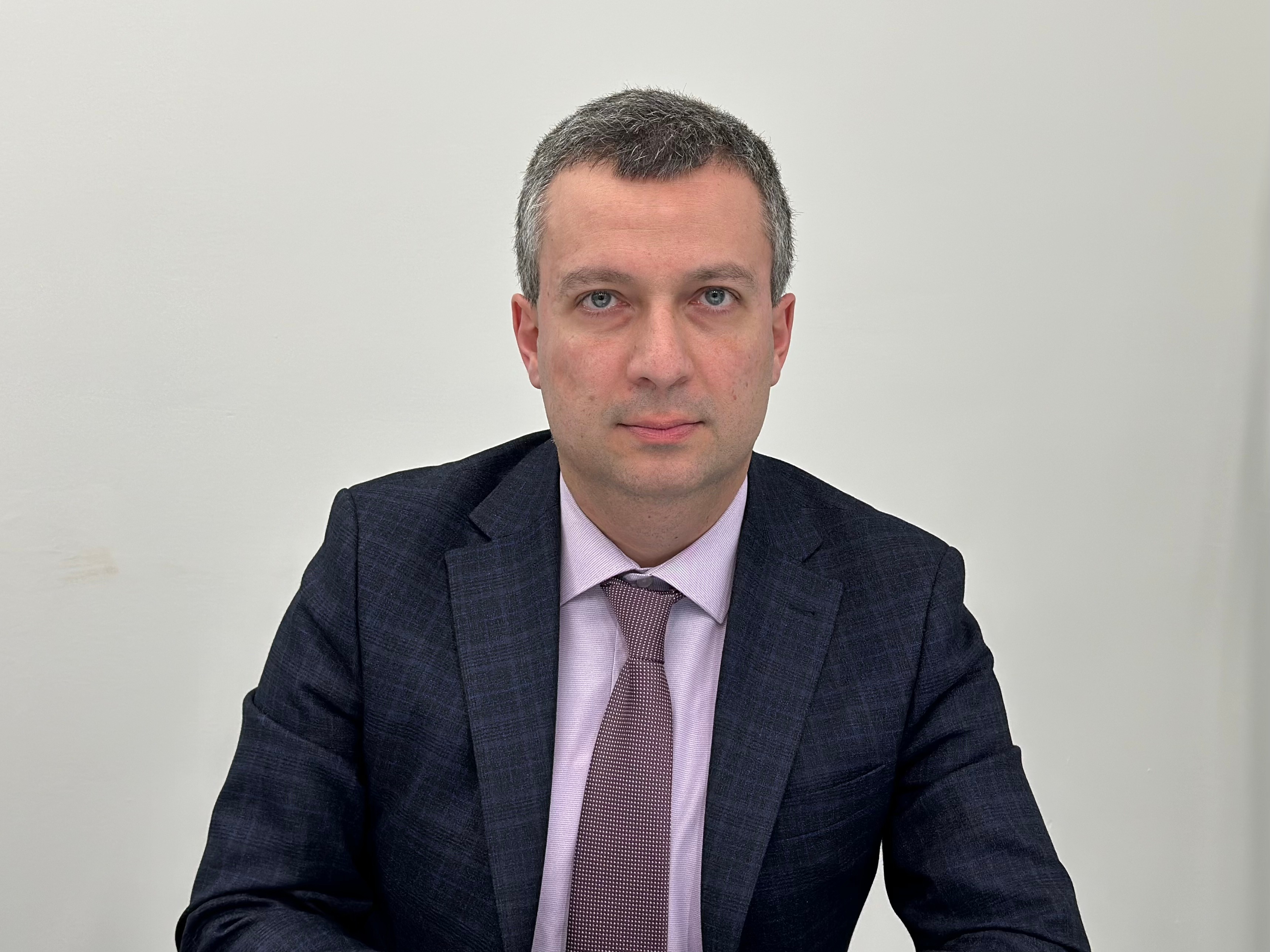
Groong Links:
Guest:
Topics:
- New Leadership Coming to Many Countries
- Aliyev Continues to Thumb the Nose of The West
- Permanent US Defense Attaché to Armenia
- Mid-year Review of our 2024 Predictions
Episode 347 | Recorded: July 22, 2024
Show Notes
Elections in the US and Georgia
2024 is a pivotal year of elections worldwide and in our region that might have a drastic effect on the future of Armenia. So we’d like to spend some time discussing these developments.
United States
One of the most globally important political races this year is the presidential race in the US. The prospect of a Trump presidency has always been a real possibility, and after the assassination attempt on him on July 13, his ratings appear to be on the rise. Also, last week he became the official Republican nominee during the Republican National Convention (RNC), and Joe Biden ended his campaign to seek re-election and passed the torch to his VP Kamala Harris.
Question:
- How will a potential Trump presidency affect US policy in the region and Armenia specifically?
- How would you assess JD Vance’s announcement as VP candidate?
- Why did Armenia’s dingbat in DC - err ambassador, - Makunts, attend the RNC?
- Is it appropriate, or wise, or whatever…
Georgia
Georgia is holding parliamentary elections in October 2024. We know that there is a big rift between the current Georgian Dream ruling party and the west to the point where Georgia’s EU candidacy has been paused and a number of sanctions have been imposed against the ruling party leadership after the recent law “On Transparency of Foreign Influence”, among other anti-liberal legislative changes introduced in the country.
Therefore the upcoming parliamentary elections in October are seen as pivotal in determining the future direction of Georgia, whether the country will reject the conservative policies of Georgian Dream and punish the party in the polls or whether the voters will approve of the GD policies and therefore put Georgia’s EU relations on ice for the foreseeable future.
Some analysts see the upcoming polls in Georgia as pivotal also for Armenia.
Questions:
- How important are the elections in Georgia for Armenia?
- The West frequently accuses Georgia of serving Russian interests. Is Turkey a player in Georgian politics?
- Do you have any predictions? What are the main scenarios that could unfold?
Azerbaijan Parliamentary Elections on September 1
Aliyev announced recently that Azerbaijan will hold parliamentary elections on September 1.
Questions:
- What is the purpose and reason for these elections?
- Could these elections be related to COP29 in Baku in October?
- And the rumored war on Armenia following COP29?
- Today Azerbaijan invited Armenia to attend COP29.
Armenian Azerbaijani Negotiations
At every negotiation opportunity, we see that Aliyev continues to thumb his nose at The West. Since Thursday, the Armenian and Azerbaijani foreign ministries started blaming each other for the failed meeting between Ilham Aliyev and Nikol Pashinyan that was supposed to take place on the sidelines of the European Political Community summit at the Blenheim Palace in Oxfordshire, UK.
First, the Azerbaijani side blamed Pashinyan. About an hour later, the Armenian Foreign Ministry made a statement saying that it was Azerbaijan who had rejected the meeting.
This breakdown seems to be counter to the previous optimistic picture in the negotiations painted by US state department officials last week who described the sides as being very close to some type of agreement.
Questions:
- Who was responsible for the failure of the meeting, and what was the reason for it?
- Where does this put the current state of Armenian Azerbaijani talks?
- Whatever happened to the demarcation and delimitation?
Europe
Both Scholz and Macron were at this summit. And despite the efforts of European diplomacy to achieve a PR win and to ensure a meeting happens, it fell through.
Questions:
- Does Aliyev holds all the trump cards against the EU as a mediator, when it comes to Armenia-Azerbaijan affairs?
- Which EU power has the ability to compel Aliyev to come to the negotiating table, or do anything?
- The EU clearly expects to remain engaged because as Toivo Klaar just retired, Magdalena Grono was assigned to the Caucasus. Who is she?
Azerbaijan has shown that:
- It can conduct ethnic cleansing of Armenians, without consequences
- It can ignore 2 rulings of the international courts, without consequences
- It can break its political promises to EU regarding negotiations, without consequences
United States
At the NATO summit last week in Washington DC, representatives from the US State Department said that both sides must be ready to make “tough” compromises, and that the US would “push” the sides to achieve peace.
Despite the talk of compromises, so far we only see single-sided concessions by Armenia.
Questions:
- What are these “tough” compromises envisioned or expected by the state department?
- What leverage does the US have against Azerbaijan to compel them to negotiate in good faith with Armenia?
3+3 Format
If the US and the EU are failing as mediators, is it possible that some kind of a regional format may compel Azerbaijan to negotiate in good faith?
- Russia: If the active war in Ukraine ends, then Russia may have more interest to be involved with Azerbaijan, or in the Caucasus.
- Iran: We know that the only reason Armenia still has Syunik is due to Iran.
This week, Iran’s ambassador to Armenia said that the next meeting of the 3+3 format will be held in Turkey, soon.
Questions:
- Armenians are very skeptical of any organization that has Turkey in it. However, is it possible that the key to preventing Aliyev from attacking Armenia lies in regional players such as Iran, Russia and even Turkey?
Permanent US Defense Advisor for Armenia
Last week deputy US under-secretary of state Uzra Zeya was in Armenia and announced that the US will station a permanent advisor in the Armenian defense ministry, to elevate the US-Armenian relationship to a strategic level.
Needless to say Russia doesn’t approve of this, the same as they didn’t like the US-Armenian “Eagle Partner 2024” exercises in Armenia. Russia has in the past requested clarification from Armenia as to what these military and defense accords really mean, and Armenia just responds that they are not aimed at any third countries.
Questions:
- What is the significance of this permanent posting, and what does a “strategic partnership” mean for Armenia and the US, especially in light of Armenia’s perhaps titular-only membership in the CSTO and alliance with Russia?
- Is there a precedent for this outside of georgia/ukraine. For instance does Russia have an “advisor” in the Armenian MOD?
- In 2018, the US appointed a defense attache to its Armenian embassy. But what is the role of an “advisor”? What is different here?
- Russia as we noted has said that these accords can mean geopolitical troubles for Armenia. What consequences could they be foreseeing, or calculating?
- Do you think that Russia’s rejection this past week of Armenian agricultural exports, attributed to “excessive pesticide content”, is actually a political warning?
Mid-year Review of our 2024 Predictions
As our listeners know for the past couple of years we’ve made end-of-year predictions for the upcoming year. You can refer to our show and show notes for Episode 300 of December 31, 2023, for our 2024 predictions.
So we thought we’d do a quick mid-year review today.
Questions to each participant:
- How do you see your predictions coming along?
- Given where we are, how would you adjust them, if anything?
Benyamin modifies his high probability assumption to medium probability.
- Medium: Some sort of Armenia-Azerbaijan agreement will be signed, but threats on Armenia will continue.
Hovik also modifies his high probability to medium probability.
- Medium: Some meaningless Armenia-Azerbaijan “treaty” will be signed.
- Also modifies that the Enclaves may not be “captured” by Azerbaijan, since Pashinyan seems to willingly give them away.
Asbed modifies his medium probability prediction from 50-50 to 75-25.
- Medium: Trump has a 75% chance of being elected US president again.
Thoughts from the Participants
- Benyamin: When it comes to promises like “EU membership”, “Visa liberalization”, etc. Let’s be more sober and less emotional in our expectations.
Wrap-up
That’s our Week in Review, we hope you found it helpful. We invite your feedback and your suggestions, you can find us on most social media and podcast platforms.
Thanks to Laura Osborn for the music on our podcasts.
Guests

Benyamin Poghosyan
Dr. Benyamin Poghosyan is a Senior Research Fellow at APRI Armenia, a Yerevan based think tank,and the Chairman of the Center for Political and Economic Strategic Studies. He has served as the vice president for research and head of the Institute for National Strategic Studies at the National Defense Research University in Armenia. Dr. Poghosyan was a Distinguished Research Fellow at the US National Defense University College of International Security Affairs. He is a graduate from the US State Department Study of the US Institutes for Scholars 2012 Program on US National Security Policy Making. He holds a PhD in history and is a graduate from the 2006 Tavitian Program on International Relations at Fletcher School of Law and Diplomacy.
Hosts

Asbed Bedrossian
Asbed Bedrossian is an IT professional, and for years oversaw the central IT enterprise infrastructure and services at USC. His decades of experience spanned across IT strategy, enterprise architecture, infrastructure, cybersecurity, enterprise applications, data center operations, high performance computing, ITSM, ITPM, and more.
Asbed founded the Armenian News Network Groong circa 1989/1990, and co-founded the ANN/Groong podcast in 2020.

Hovik Manucharyan
Hovik Manucharyan is an information security engineer who moved from Seattle to Armenia in 2022. He co-founded the ANN/Groong podcast in 2020 and has been a contributor to Groong News since the late 1990s.
Disclaimer: The views expressed by Hovik Manucharyan on the ANN/Groong podcast are his own and do not necessarily reflect the opinions of his employer or any other organization.